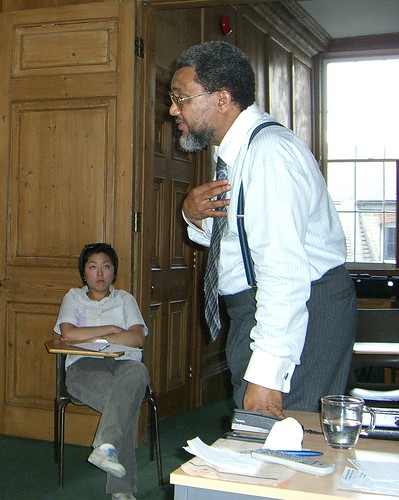Professor Share writes from London:
My British Politics class was fortunate to have a recent visit from Dr. Daud Abdullah, the Deputy Secretary General of the Muslim Council of Britain (the chief umbrella group representing British Muslims.
Dr. Abdullah provided a brief overview of Muslims in the UK, noting that there about two million Muslims in the UK (about 3% of the total UK population), concentrated largely in London (where 1 out of every 7 residents is Muslim). The 2001 census was the first to identify respondents as Muslim, allowing Abdullah to paint a picture of British Muslims as the UK’s most marginalized group that face endemic poverty, high unemployment, low life expectancy, job and housing discrimination, and political marginalization (only 5 members of the lower house are Muslims).
Much of Dr.Abdullah’s talk described the growing hostility against British Muslims, a trend that he contends started before 9/11, but that has certainly exploded since then. He argued that measures aimed at isolating Islamic fundamentalists have been implemented in ways that alienate the bulk of British Muslims, and that are therefore counterproductive. Indeed, a headline in today’s Times of London noted that the UK’s intelligence agency, MI5, has launched a program to track Islamic fundamentalists modeled on the system in place to track sex offenders. Abdullah noted that of the over 12,000 arrests of British Muslims since 2001, only 43 convictions have resulted, the vast majority of which are unrelated to terrorism. Dr. Adbdullah blamed the UK media for fanning the flames of anti-Muslim hysteria.
There has been much controversy in the UK about the right of women to wear the niqab, a face veil favored by a tiny minority of UK Muslims (though no French-style controversy over the headscarf). In October 2006 Jack Straw, Labour leader in the Commons, stated that, ”the increasing trend towards covering facial features was "bound to make better, positive relations between the two communities more difficult,” referring specifically to doctor-patient relationships and other interactions in the public sphere. In February 2007 the UK’s highest court upheld the right of schools to ban the wearing of the niqab in UK schools, on the grounds that the niqab prevents teachers from viewing facial expressions of students. While admitting that the niqab is a source of division within the UK Muslim community, Dr. Abdullah argued that the British Muslim Council favors a policy of tolerance, unless public safety is clearing compromised. He views the debates over clothing as a smokescreen for a larger societal attack on the British Muslim community.
When asked about the major political parties, Dr. Abdullah noted that while British Muslims traditionally vote Labour, many view Labour as having taken their votes for granted. And while the Liberal Democratic Party has opposed the Iraq war and has consistently supported civil liberties in the face of domestic security legislation, Abdullah thought that Muslims would not likely vote for the LDP until it appeared that the Liberal Democrats had a realistic chance to take power.
In preparation for Dr. Abdullah’s visited I assigned (among other materials) a provocative article from the National Review (here). You can read an article by Dr. Abdullah in the Guardian (link: http://www.guardian.co.uk/commentisfree/story/0,,1924197,00.html
Professor Share provides a second relevant article
here.
Tags:

